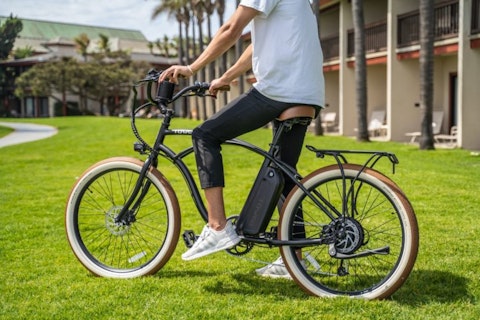In this article, we look at the 20 most bicycle-friendly countries in the world and talk about governments that are offering financial incentives to the public to switch their mode of transportation to biking. We also discuss measures taken by bicycle manufacturers and ride-sharing companies to reduce carbon footprint in geographies they operate in. You can skip our detailed analysis on this subject and head over directly to the 5 Most Bicycle-friendly Countries in the World.
Globally, the bicycle market size is estimated to be worth over $100 billion as of 2022, and is projected to grow at a CAGR of 11% to reach $229 billion by 2030, as noted by Fortune Business Insights. Much of the demand in cycling is being driven by an increased awareness of the health benefits associated with biking, as well as the growing realization of the threats posed by the global warming. A focus on developing bike-friendly infrastructure in major cities across the world has also encouraged citizens to switch their mode of transportation from vehicles to bicycles, which also presents them with an opportunity to escape from daily traffic congestions in larger metropolitans.
A research in 2021 at the University of Oxford found that switching one car trip with a cycle ride per day can save an average person about 3.2 kg of carbon, which is equivalent to driving a car for 10km or sending 800 emails. Using a bicycle to commute even once a day can have a profound impact on the environment around us, which is why several governments across the world are taking initiatives to reduce carbon footprints.
In some countries, you even get paid for cycling. Several businesses in the Netherlands reward bikers with tax credits of €0.19 per kilometer. The Italian city of Bari pays cyclists €0.21 for every kilometer they commute to work with a cap of €25 per month. The local government also offers contributing up to €155 to buy a new bike.
Large corporations across the world are also aligning their offerings with environmental needs, with a key focus on sustainability. Uber Technologies, Inc. (NYSE:UBER), in 2018, announced to switch its focus from taxis to electric bikes and scooters. During the same year, Uber Technologies, Inc. (NYSE:UBER) launched e-bikes in US cities, and also acquired bike-sharing startup, JUMP, for $200 million. Besides that, Uber also invested $170 million in electric scooter company Lime in 2020.
After launching e-bikes in cities across North America and Europe, Uber Technologies, Inc. (NYSE:UBER) entered Africa in August this year with its electric motorbike service in Kenya, in line with the company’s vision of an emissions-free globe by 2040. According to NASDAQ, Uber’s stocks have gained 3.7% since the launch, amid plans of expanding the e-biking service to other countries in the continent.
The e-bikes industry has been thriving for some years now. American motorcycle manufacturer Harley-Davidson, Inc. (NYSE:HOG)’s financials stated that of the total electric based revenue it generated in 2019 and 2020, from both motorbikes and bicycles, about 50% of it came from selling kids e-bikes, which suggests an encouraging trend of biking among the youth of the US. Harley-Davidson, Inc. (NYSE:HOG) also has electric motorcycles in its product line, and was one of the first companies to launch the two-wheeler during the last decade. CEO Jochen Zeitz believes that Harley-Davidson, Inc. (NYSE:HOG) will become a 100% electric brand in the years to come.
Methodology
We have ranked the 20 most bicycle-friendly countries in the world using consensus methodology where we analyzed bikeability of countries and cities listed on Euro News, UCI World Rankings, Global Bicycle Index, and Expatify. We have assigned scores to countries depending on how often a country or its cities were listed on each of these websites. These scores were then aggregated to get an overall score. The most bike-friendly countries in the world are listed in this article in ascending order of those scores.

tower-electric-bikes-ktIBQb_0G2g-unsplash
Let’s now head over to the list of the most bicycle-friendly countries in the world.
20. China
Score: 0.89
Bicycles have been a vital part of the Chinese lifestyle for several decades, until the 1990s after which the Chinese gradually shifted to more advanced modes of transportation. Having said that, still an estimated 20 million people use bicycles to commute in the country, according to VOA which quoted the Chinese Cycling Association. Hangzhou and Beijing were listed among the top 50 bike-friendly cities in Luko’s Global Bicycle Cities Index 2022.
19. Japan
Score: 0.93
It is a common sight in Tokyo to see mothers riding a bike to pick their children up from kindergartens, kids cycling to school, as well as police officers on patrol. The bike-sharing industry in Japan is also growing. It was valued at $40 million in 2022 and is projected to increase in size to $57 million by 2029.
18. United Kingdom
Score: 0.96
4% of the population in the UK bikes daily, while 10% ride a bike a few times every week, according to Euro News. The government has planned to spend more than 2.5 million pounds between 2020-2025 to upgrade infrastructure for cycling and walking across multiple cities of the UK.
17. Spain
Score: 1.07
Barcelona has a successful bike-sharing program, called Bicing, which has an annual ridership of 30,000 people. A number of other cities are developing their bicycle infrastructure as well to encourage more people to use bikes. Valencia and Seville are other prominent cities of note besides Barcelona that are known for being bicycle-friendly in Spain.
16. New Zealand
Score: 1.17
New Zealand is one of the most bicycle-friendly countries in the world due to a mix of its infrastructure, trails, and beautiful landscape. Mountain biking is very popular in the country, and about 80% of all bicycles sold are mountain bikes according to the Bicycle Industry Association of New Zealand.
15. Canada
Score: 1.22
The 2022 survey by Ipsos reported that only 4% of Canadians use a bicycle to commute, however, encouragingly, 23% said that they bike regularly to exercise. 41% of the population believes that the government needs to prioritize spending on improving biking infrastructure in the country.
14. Italy
Score: 1.22
About 60% of the Italian population does not use bicycles at all. However, the trend is gradually shifting towards more people using bikes to commute. An estimated 13% of the population bikes at least once a day. This figure is likely to increase in the coming years as the government works to enhance biking infrastructure. Italy, in 2022, announced construction of 1,800 kilometers of cycling routes to be built at a cost of 600 million euros.
13. United States
Score: 1.44
Oregon, Colorado, Washington, Montana, and Wyoming are among the top bike-friendly states in the US. While just 0.6% of Americans use bikes to commute, the trend is gradually growing with the development of bicycle-friendly infrastructure in different cities of the United States. You can read more about this in our article, 15 Most Bike Friendly Cities in the US.
12. Norway
Score: 1.59
Norway is one of the most bicycle-friendly countries in Europe and the world due to its infrastructure for cyclists. This year, the country opened Europe’s longest car-free tunnel, which is 2.9 km long, and aims to promote cycling and walking. The government announced in 2016 that it would spend $1 billion over the next decade or so to build bike-friendly infrastructure to achieve zero growth in car use by 2030.
11. Slovenia
Score: 1.59
According to Euro News, about 12% of the population in Slovenia cycles daily, while 24% do so a few times in a week. The capital city Ljubljana boasts a biking route network of more than 300 kilometers and has reduced carbon emissions in the city by 70% over the last decade due to an increasing number of locals switching to bicycles to commute.
10. Switzerland
Score: 1.60
Switzerland is home to over 8,500 kilometers of biking trails, and the government has been developing a network of routes since 1998 to encourage cyclists. Moreover, the country offers stunning landscapes that fascinate locals and tourists alike. The Swiss legislature in 2018 voted to enshrine biking and its infrastructure into the country’s constitution. The approval made federal authorities responsible to develop more cycling routes across Switzerland.
9. Colombia
Score: 1.75
Colombia is leading the way for Latin American countries when it comes to promoting biking. Bogota, in particular, is known for its cycling infrastructure and hosts regular cycling events during which cars are barred from highways. Moreover, the city has reduced its carbon footprint by over 40% since 2010 by urging the public to use public transport or bikes instead of their personal cars.
8. Belgium
Score: 1.78
Belgium is next on our list of the most bicycle-friendly countries. It has one of the oldest financial incentives programs for rewarding bikers, which started way back in 1999. About 12% of Belgians use cycle as their mode of daily transport.
7. Finland
Score: 1.86
Finland is among the few countries that have a higher percentage of regular cyclists compared to the EU’s average. An estimated 28% of the population in Finland ride a bicycle daily, while 57% of the people cycle at least once a week.
6. Sweden
Score: 1.87
According to a report in Euro News, 42% of the population in Sweden cycle at least once a week, while biking is the mode of transport for about 21% of the people. Uppsala, Orebro, and Gothenburg are considered to be among the most bike-friendly cities in the country.
Click to continue reading and see the 5 Most Bicycle-friendly Countries in the World.
Suggested Articles:
- 15 Biggest Bike Companies in the World
- 25 Most Environmentally Friendly Companies in the World
- 25 Countries that Produce the most Carbon Dioxide Emissions
Disclosure: None. 20 Most Bicycle-friendly Countries in the World is originally published on Insider Monkey.





